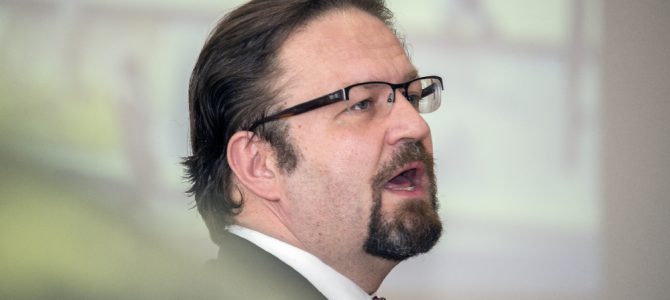
Andrew Reynolds may be a good professor of global studies, but he’s pretty bad at basic research, at least where Sebastian Gorka is concerned. Reynolds recently made a startling accusation that Trump advisor Gorka’s PhD dissertation was short on research and approved by an unqualified committee at an unserious academic institution. He called Gorka a “fraud—a charlatan of the most brazen hue.”
This story has gained traction, as Gorka (second only to Stephen Bannon) elicits especially intense reactions from opponents. Gorka has been subjected to intense media and public scrutiny, including being run off the stage at Georgetown by students who also questioned his credentials and accused him of anti-Semitism, and tarred by comedian Samantha Bee. The ensuing feeding frenzy apparently nearly cost Gorka his White House post.
I write not so much in defense of Gorka, whose policy views are not my own, but in defense of the truth. What Reynolds and many others have been saying about Gorka runs from the merely unwarranted to the demonstrably false.
Who Is Sebastian Gorka, Anyway?
If the name is unfamiliar, Gorka is a deputy assistant to President Trump, and because of that would be a figure of controversy no matter how mild-mannered in person. Gorka is not mild-mannered. In place of the usual academic hesitancy, laden with qualifications, he offers arresting candor.
Moreover, he has come in for special hatred from Reynolds, it seems, because Gorka displays hallmarks of academic respectability—dapper dress, English accent, PhD credentials—while espousing views many academics find embarrassing, wrongheaded, and even scandalous.
Hatred, however, is no justification for libel. A little online digging was all it took to show Reynolds’s assertions to be unsubstantiated. The search began at Corvinus University of Budapest’s library, Gorka’s alma mater, where online versions of both his dissertation and a shorter summary are available. Reynolds directs much of his criticism at the qualification of external reviewers listed in the summary, and he assumes they were the only reviewers.
But why assume that? Labeling them “external” already implies they’re not the only reviewers and, indeed, a current university policy document requires a committee with internal members, external members, and a public defense. Reynolds would need to know the exact composition of the committee to reach his conclusion, and he offers no evidence of such knowledge. It seems to me before you try to destroy a man’s career, this is the sort of detail you make sure you get right.
Let’s Look at That Dissertation
Gorka’s dissertation document is 240 pages total, with 264 footnotes in 195 pages of the main text, all fairly standard. His superviser, Lánczi András, is a professor at Corvinus University, head (rektora in Hungarian) of the Political Science Institute, and a former Fulbright research grant recipient in the United States. Those are standard, even impressive, credentials and certainly pass the initial smell test.
There was also a second adviser, professor Stephen Sloan, who is a distinguished fellow for the Global Perspective Office at the University of Central Florida (UCF) where he was previously Lawrence J. Chastang Distinguished Professor of Terrorism Studies. Sloan’s PhD is in comparative politics from New York University (NYU), a university of considerable prestige.
Gorka’s dissertation identifies Sloan’s affiliation as Temple University, also a top research university. Around the time Gorka completed his dissertation, a press release from Syracuse University identified Sloan as “a terrorism expert from the University of Central Florida and Temple University,” so nothing appears to be amiss there, either.
Either Reynolds has blundered rather embarrassingly, or (much more likely) this is a mendacious ideological attack—and a sloppy one at that. Academics justly bristle at phony claims to the hard-won respectability attendant upon a PhD. The path to a terminal degree is arduous, the demands extreme, the costs—both personal and financial—great. But in using concerns about academic rigor and credibility as a cloak of respectability around a nakedly ideological attack, it is Reynolds, not Gorka, who has damaged academia.
He has helped poison an environment where personality is supposed to be subordinate to reasoned debate, where ideas are supposed to matter more than prestige, and where the truth is supposed to be the standard against which all claims are measured. Reynolds has an impressive CV; he is entitled to disagree with Gorka and on debatable matters of policy may even be right. But his baseless attack violated the standards he’s supposedly defending.
He could have, and should have, used his considerable research skills and resources to go a little deeper and discover the facts about Gorka, then gotten on with the business of the actual disagreement: crucial matters of domestic and foreign policy for which we all need and benefit from the valuable insights of academic experts. Reynolds just couldn’t resist the temptations of righteous indignation instead. The ideologue never can.








